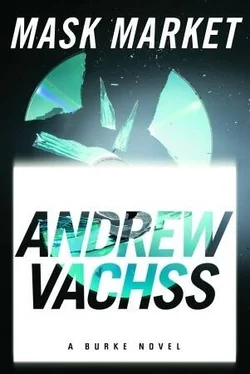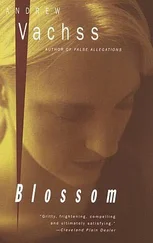Mama’s lips twisted—whether with pleasure at her family’s immediate recognition of the impostor, or in admiration of Max’s drama-queen performance, I couldn’t tell.
As soon as she left, I told Clarence about the time we had rescued Beryl Preston, watching the recognition flash in Max’s face, hearing the Prof say, “Oh yeah. That one,” next to me.
“Her name is different now,” the West Indian said. “Why would that be?”
“I don’t know,” I said. “She came from money, that much we know. If only her last name was different, maybe she got married. But…”
“What’s the front name she’s using now?” the Prof asked.
“Peta.”
“And it was, what, Sapphire or something?”
“Beryl.”
“Middle name, maybe?”
“Nope. The girl we pulled away from that pimp, her middle name was Eunice. This one—on the CD—didn’t have a middle name at all.”
“Maybe the guy who wanted you to find her, he didn’t know it.”
“No, Father,” Clarence told the Prof. “There was a wealth of information there. Very, very detailed. If the woman had a middle name, it would have been there, I am sure.”
“And the guy who hired me, I don’t think it was money he was after,” I added, more sure of myself than when the Prof had first asked, even though I couldn’t say why.
Max responded to my rubbing my first two fingers and thumb together and giving a negative shake of my head with a “What then?” gesture.
“I don’t know,” I told them all. “He did have a whole lot of financial information on that CD, but if he was her money manager, he’d have known all that, anyway. And those photographs…that’s personal, not professional. It’s like the only reason he had all the financials listed was just to help whoever was going to look for her.”
“You think she played the player?” the Prof said.
“That would fit. He wouldn’t be the first manager to get himself managed. But let’s say she did—why would she just disappear after that? If the stuff on the CD is true, she had loads of assets in her own name. Legit, aboveground stuff. She gets in the wind, she can’t get her hands on any of that. Who gets to steal so much that they can afford to walk away from millions?”
“This guy, the one who hired you, he had money, right?”
“Looked like it, sure. But I only saw him that one time; it could have all been front.”
Max clasped his hands in front of him, then slowly pulled them apart. His fingers made a plucking gesture, one hand taking from the other. The looted hand balled into a fist as the thieving hand fled.
“They were a partnership, maybe working some kind of paper scheme, and she ran off with all the cash? Could be,” I acknowledged. “That’d make him spend time and money looking for her, sure.”
“And if she really had all that coin, she could buy herself major muscle,” the Prof said.
“But now that the man who was looking for her is…out of the picture, would she not come back to her own home?” Clarence asked.
“Maybe he wasn’t the only one looking,” the Prof said, lighting a cigarette.
“Right,” I agreed. “We don’t know anything about the shooters. If they were working for her, that’s one thing. She’s got that kind of protection in place, making too much noise looking for her is a good way to get ourselves dead. But if they were looking for her themselves…”
“Yeah,” the Prof rode with me. “Same thing. But we can’t go nosing around the dead guy’s life. The cops would get on that like a priest on an altar boy.”
“I’m not worried about that end of it,” I said. “Not now, anyway. If she stole from the dead guy, she’s got the money. Finding her, that’s what we have to do. But I’m not even going to start looking until we know one thing: How did the shooters know where the guy who hired me was going to be that night? That’s the only way to know if I’m in the crosshairs, too.”
Nobody said anything for a few minutes.
Finally, Max got up. He returned with a handful of objects he had pulled off other tables. Identifying each one with gestures, he constructed a triangle on the tablecloth: the guy who hired me, the girl, and the shooters. Then he built another: the guy who hired me, the shooters, and me. One more: the guy who hired me, the shooters…and Charlie Jones. Using chopsticks, he built a matrix. When he was done, a wooden arrow pointed right at the ferret.
“Charlie tipped off the shooters?” the Prof said, touching Max’s chart.
Max shrugged his shoulders.
“Even if he did, he would not have to bring Burke’s name into it, would he?” Clarence said.
Now it was the Prof’s turn to shrug. “Who we gonna ask?” he said. “We don’t know who the shooters are. And nobody knows where Charlie cribs.”
“If he’s kept the same place he had years ago, we might know,” I said.
“How?” the Prof asked. But his voice was already tightening against what he knew was coming.
“The book,” I told them, gesturing to Max at the same time.
T he book was Wesley’s once. Mine now. It had shown up in one of my drop boxes after Wesley had canceled his own ticket. What the media called his “suicide note” was a confession to a whole string of paid-for homicides. A couple of those had been mine. Wesley knew how things worked: If he left the cops enough to clear those cases, it was the same as clearing me.
But Wesley hadn’t told them everything. That was in the book he had mailed to me. The killing machine had recorded it all, the details of every hit: who got done, who paid for it, and how much. That was my legacy, a Get Out of Jail Free card, but I could only play it once. I hoarded it tight, my most valuable possession.
I knew Charlie Jones had to be in that book. He’d never put a penny in Wesley’s hand, but he was a bridge to plenty who had. And the iceman always covered his back trail.
“Mama,” I said, when she came over to where we were sitting, “could I have the book?”
I didn’t have to say anything more. Her eyes narrowed, but her expression didn’t change. Mama was our family’s bank, and Wesley’s book was in what passed for a safe-deposit box. Only, in Mama’s house, you never say the iceman’s name out loud.
“Now you want it?”
“Please.”
“Order food. I get it, okay?”
Meaning: The book was buried somewhere in the catacombs under the building that housed the restaurant, and it would take a while for her to dig it out.
“Bring me some duck for luck,” the Prof said to one of the white-coated hard men who passed for waiters in Mama’s joint.
I t was almost an hour before Mama came back. She put a thick notebook about the size of my hand on the tablecloth and walked away, as if afraid it was going to explode. The book was bound in oxblood leather, with a gold ribbon page-marker, its fine linen pages almost three-quarters full of Wesley’s tiny, machinelike printing. I always wondered where he had found such a book, and what he would have done when he ran out of pages.
I’d been through the book plenty of times before, but every time I opened it, there always seemed to be more than I remembered, as if my ghost brother was still making entries from wherever he was. There was no real organization or index, but it moved in rough chronological order. From looking at the first date, I could tell Wesley hadn’t started his book when he’d started killing. That would have been a long time earlier, back when we were kids.
I felt the book throb in my hands. Not like a beating heart; like an oncoming train. I opened it, and started reading.
Читать дальше











